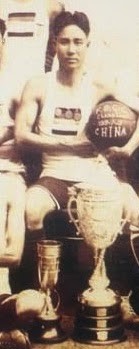Name:
Tang FuxiangNickname:
"The King of Far East Football"
Country:
 China
ChinaClub:
South ChinaPosition: *
CF,
CMF ,
SSSide:
RF/BSAge:
23-26 years (xx/xx/1893)
Height:
??? cmWeight:
?? kgAttack:
80Defence:
48Balance:
77Stamina:
72Top Speed:
76Acceleration:
78Response:
72Agility:
74Dribble Accuracy:
75Dribble Speed:
70Short Pass Accuracy:
81Short Pass Speed:
75Long Pass Accuracy:
78Long Pass Speed:
72Shot Accuracy:
80Shot Power:
85Shot Technique:
78Free Kick Accuracy:
64Curling:
60Header:
72Jump:
74Technique:
75Aggression:
70Mentality:
81Goalkeeper Skills:
50Team Work:
76Injury Tolerance:
BCondition:
5Weak Foot Accuracy:
5Weak Foot Frequency:
5Consistency:
6Growth type:
StandardCARDS:P11 - Long Ranger
S02 - Passer
S04 - PK Taker
SPECIAL ABILITIES: Tactical Dribble - Playmaker - Passing - Middle Shooting - Penalties
Attack/Defence Awareness Card: Attack MindedINFO:Tang Fuxiang was originally from Heshan County, Guangdong Province. Later, his family moved to Hong Kong to grow flowers for a living. Tang Fuxiang loved sports since he was a child. After entering English Middle School, he received English football training classes, and became obsessed with football.
In 1913, China established the first national football team in Chinese history with the South China Football Club, which had just won the national championship, and went to the Philippines to participate in the first Far East Games. Tang Fuxiang, the captain of South China, naturally became the first captain of the Chinese national team.
Only two teams from China and the Philippines signed up for the first Far East Games. In the early 20th century, the Philippine sports level was in a leading position in Asia, In the face of a strong enemy, the Chinese team has constantly used their skillful cooperation to break the gap between the two wings. Guo Baogen and Feng Ping have both got a good chance to face the goalkeeper alone, but they wasted one by one because of their haste.
Thirty minutes into the first half of the game, Tang Fuxiang, the captain, stood out and crossed the goalkeeper after winning four defenders of the opponent. He scored the first goal in China's international football match.
Although in the second half, the Chinese team finally lost the first game of the international competition after the Philippines team, which was obviously superior in strength, fought back, Tang Fuxiang's performance in the first show of the international competition of the Chinese team was still praised by the Far East Games Organizing Committee.
After the failure of the first Far East Conference, Tang Fuxiang and others learned from their mistakes and felt that they could not select talents only in Hong Kong. They began to expand the selection of national teams to Guangdong, Shanghai and Hong Kong by playing friendly games.
When the Second Far East Games started in 1915, the newly established Chinese national team won two of three games against the Philippines. Tang Fuxiang was at ease. He showed great general demeanor both in passing and organizing. He assisted his teammates to score three goals in two games, helping the Chinese team win the first international championship in history.
By the time of the Third Far East Games in 1917, Tang Fuxiang's reputation had reached its peak. First, he scored a world shock 30 meters away from the gate in the match with the Japanese team. While helping the team win the Japanese team by 5:0, he also completely conquered the audience in Japan.
As a result, most of the Japanese audience cheered Tang Fuxiang in the second championship fight with the Philippines. Tang Fuxiang played with great composure. First, he assisted his teammates to score with an exquisite pass, then he made a long distance attack and shook the goalkeeper to shoot an empty goal. Finally, he hit the penalty kick, completely destroying the entire Philippine team with his own strength.
After this war, the Philippines completely lost its dominant position in the Asian football world, and became the backdrop for the "nine-times championship winner" of the Far East Movement Association of the Chinese football team.
And Tang Fuxiang's elegant manner and his style of a great general in the two matches also completely conquered the Japanese fans. After the game was end, Japanese newspapers took Tang Fuxiang, the Far East's King of Football, as the title one after another, and heartily praised Tang Fuxiang for "being the captain, he can command the whole team with rich experience and wisdom, and he is a model in all aspects because of his dazzling passing, heavy shooting power and accurate."

 China
China